Gum Disease Treatment Warrnambool
TMJ DISORDERS DIAGNOSIS AND TREATMENT
Leading Dental Practice in Warrnambool
Our TMJ Experts in Warrnambool is dedicated to helping you get rid of TMJ pain.

TMJ Treatment Warrnambool
Temporomandibular Joint Disorder, or TMD (sometimes called TMJ), is a set of symptoms associated with the joint connecting the lower jaw to the skull, commonly referred to as the jaw joint.
You can locate the jaw joint by placing your fingers in front of your ear and opening and closing your mouth.
TMD has many causes and symptoms, which could make the diagnosis complicated.
The best approach is to organise a diagnosis with your healthcare physicians and your dentist.
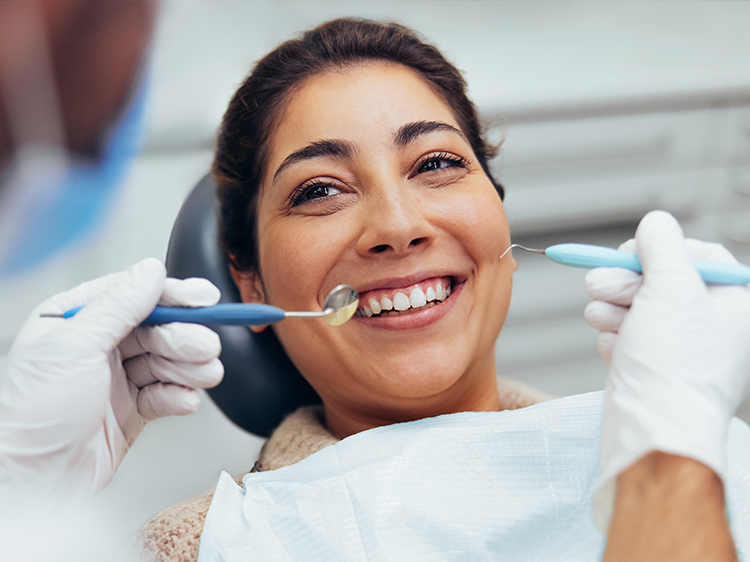
Ask About Sleep Dentistry
For patients who feel anxious about dental treatment, have a sensitive gag reflex, or require complex procedures, Sleep Dentistry offers a calming alternative. Also known as sedation dentistry, this approach allows you to undergo treatment in a deeply relaxed state—while remaining responsive and safe.
Our experienced team can offer IV sedation, oral sedation, or happy gas to ensure your comfort. Let us know before your next appointment and we can assist.
Excellence
Be sure that you will receive the best treatment & experience.
Be assured that our Warrnambool team shall provide you with The Right Choices.
We are committed to excellence in dental care & service.
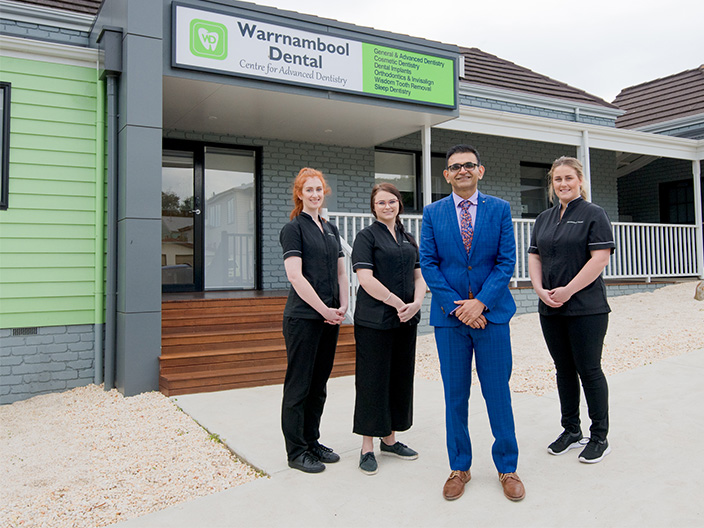
5
Reasons to Choose Us
Dental Expertise
Dr Nishant Hurria
Advanced Technology
State-of-the-art Technology
Smile with Full Confidence!
Top-Rated Dentist
Creating the Best Experience
Find Out Why Our Clients Are Smiling
For Your Convenience
Easy Parking in CBD
Smile Now, Pay Later
Start Smiling Now!
Claim From Health Funds.
Easy Application & Setup at Practice.
Our Practice
Warrnambool Dental

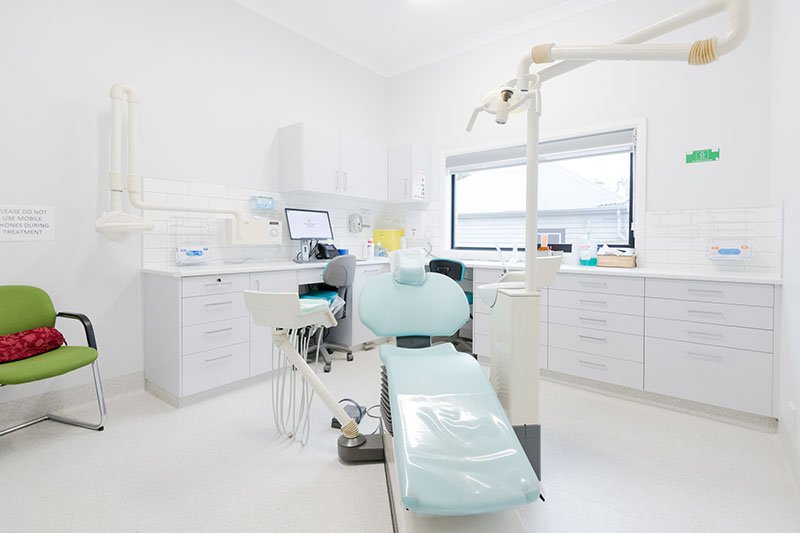

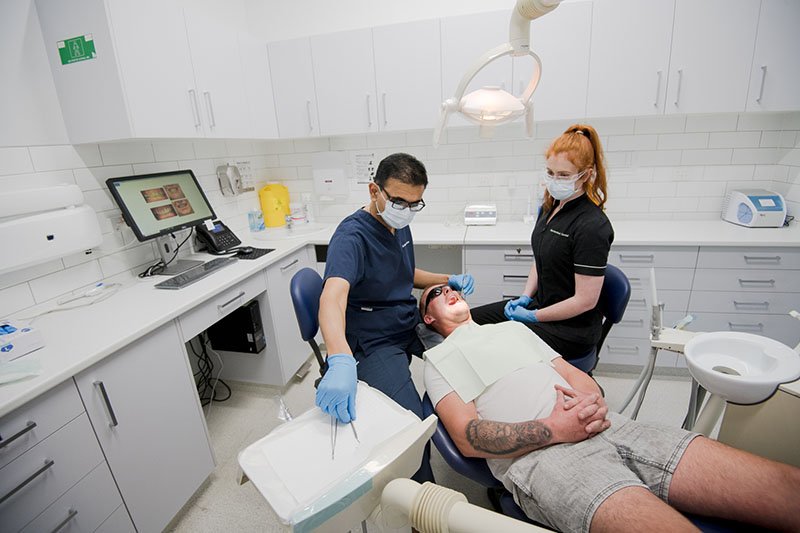
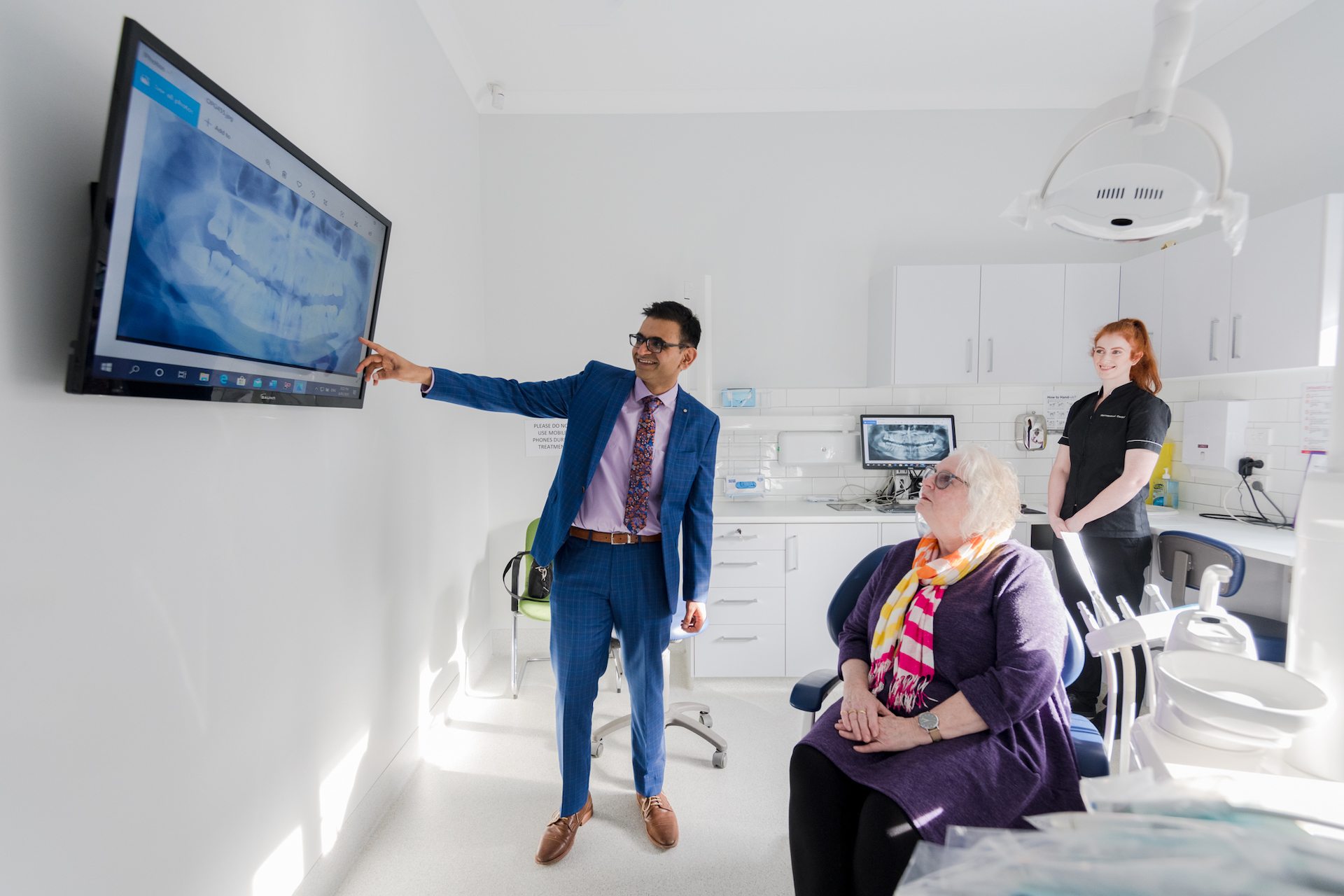
“Quality is never an accident; it is the result of high intention, sincere effort, intelligent direction and skilful execution; it represents the wise choice of many alternatives.”
Symptoms of TMJ or TMD

TMD or TMJ symptoms vary widely and include:
- Sore jaw muscles
- Toothache or dental pain
- Sinus/nose issues
- Pain in the neck or back
- Frequent headaches or migraine
- Tinnitus (ringing ears) or ear pain
- Incorrect bite
- Pain chewing or when opening mouth wide
- Inability to open mouth wide
- Pain opening or closing mouth
- Facial pain or tension
- Difficulty moving jaw
Causes of TMD
- Causes vary widely and can include:
- Injuries to jaw or jaw joint
- Rheumatoid arthritis or osteoarthritis
- Ear infection
- Poor dental work
- Bruxism, or grinding of the teeth
- Persistent clenching of the jaw
- Stress
- Occlusion issues
- Anatomical abnormalities

TMD Diagnosis

Your Warrnambool dentist will discuss your symptoms and examine your jaw by doing the following:
- Listen to and feel your jaw when you open and close your mouth
- Observe the range of motion in your jaw
- Press on areas around your jaw to identify sites of pain or discomfort
- If your doctor or dentist suspects a problem, you may need:
- Dental X-rays to examine your teeth and jaw
- CT scan to provide detailed images of the bones involved in the joint
- MRI to reveal problems with the joint’s disk or surrounding soft tissue
Warrnambool TMJ Treatment

Depending on the diagnosis, treatment may include:
Orthodontics
In many cases, TMD is the result of dental problems and can be resolved with orthodontic treatment or restoration.
Wearing Mouthguards and Splints
Treatment for TMJ or TMD may include wearing a special mouthguard that protects your teeth from damage when you grind your teeth at night.
Dental Appliance
Depending on the diagnosis, your dentist may recommend that you wear equipment such as an oral splint to correct the problem.
Surgery
If deemed necessary, you may choose to receive surgical treatment for your condition. Surgery may be required to relieve pain in the case of structural disorders that cannot be treated using any other method.
Before surgery can be considered necessary, you may receive X-rays, an MRI (magnetic resonance imaging), and a CT scan to diagnose the condition properly.
If surgery is deemed necessary, you may be referred for maxillofacial, oral, or open joint surgery.
We are here to help you answer these & more questions thoroughly.
Call Warrnambool Dental.
A smile can open doors and change lives.
(03) 5562 4433
Frequently Asked Questions
About Temporomandibular Joint Disorders
Is there a way to prevent TMJ disorders?
- If you have occasional episodes of jaw pain, avoid chewing gum or biting on hard objects, like pens or fingernails.
- Avoid eating hard or chewy foods. Support your lower jaw with your hand when yawning.
- Avoid taking large bites when eating.
- Regularly massage your jaw, cheeks, and temple muscles.
- Apply moist heat if you feel spasms.
- Maintain a good sleeping posture with neck support.
- Do not put your phone between your shoulder and neck when taking calls.
- See your Warrnambool dentist if you grind your teeth at night or often find yourself clenching your jaw.
Do TMJ problems cause headaches?
While there are several factors that cause headaches, TMJ disorder is one explanation. Stress causes us to clench our teeth unknowingly, applying pressure on the jaw joints. This can begin a cycle of facial contraction that can lead to TMJ disorder.
Do TMJ disorders require surgery?
Surgery is not the first line of treatment and is only considered when all more conservative treatments fail to manage or relieve your symptoms.
What is TMD, and how does it differ from TMJ?
TMD refers to Temporomandibular Joint Disorder, which encompasses a variety of symptoms and issues affecting the jaw joint. Conversely, TMJ refers to the actual temporomandibular joint.
What are the common signs that I might have TMD?
Common symptoms include jaw pain, headaches, ear pain, difficulty chewing, clicking or popping sounds, and limited jaw movement.
How is TMD diagnosed?
What causes TMD?
TMD can result from various factors, including jaw injuries, arthritis, bruxism (teeth grinding), stress, and misalignment of the jaw or teeth.
Can TMD go away on its own?
Mild cases of TMD may improve with rest and self-care measures. However, persistent or severe symptoms often require professional evaluation and treatment.
What are the non-surgical treatments for TMD?
Non-surgical treatments include wearing mouthguards or splints, orthodontic treatment, stress management, and physical therapy to relieve symptoms.
When is surgery recommended for TMD?
Surgery is frequently used to repair structural problems and is usually reserved for severe cases of TMD that do not improve with conventional treatments.
Will wearing a mouthguard help with TMD?
Yes, mouthguards or oral splints can help reduce strain on the jaw joint by preventing teeth from grinding and aligning the jaw during sleep.
How long does it take to treat TMD?
The chosen approach and the degree of the condition determine how long the treatment will last. Some patients may find relief within weeks, while others may require ongoing management.
Should I see a dentist or a doctor for TMD?
Both dentists and doctors can assist in diagnosing TMD. However, a dentist may be better equipped to assess and treat dental-related causes of the condition.
Can TMD cause ear-related symptoms like tinnitus or pain?
Yes, TMD can lead to ear pain or cause the jaw joint and ear canal to be closed.
ABOUT THE AUTHOR
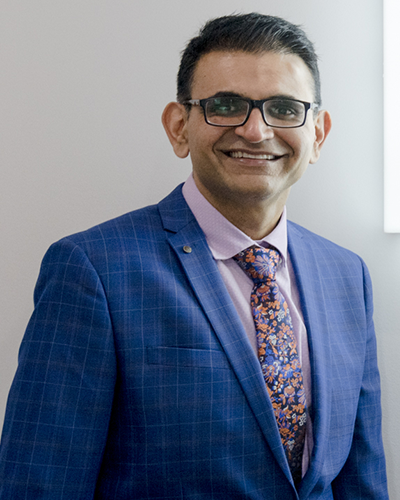
Dr Nishant Hurria
Dr Nishant Hurria is an Australian-based health professional and the principal dentist of Warrnambool Dental with a special interest in Crowns & Bridges and Dental Implants.
